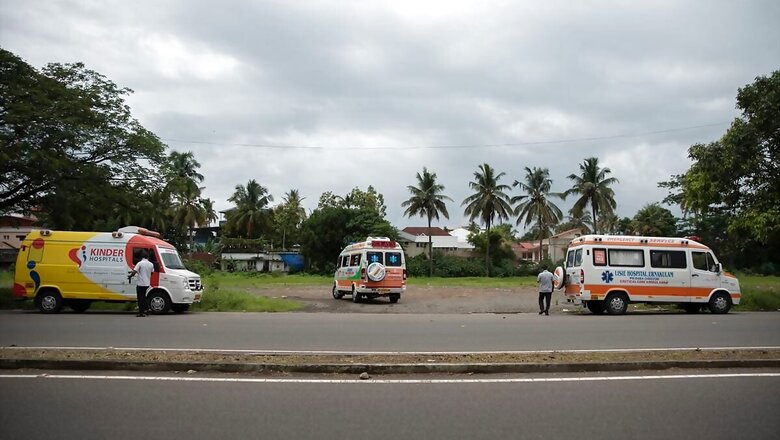
views
A long coastline, a picturesque landscape, pristine backwaters, high life expectancy and literacy, low rates of poverty, world-class healthcare, massive foreign remittances and a superior standard of living—there’s a reason they call Kerala ‘God’s Own Country’.
But even God himself would have unequivocally refused an offer to set up a business in the red state. Because just as much as it is blessed with enviable qualities, Kerala is cursed with constraints that inherently make it unfriendly for industries.
For one, Kerala doesn’t have the adequate amount of land for many full-fledged industries to flourish, all at once. And despite representing only 1.18 per cent of the total landmass, it packs nearly 3 per cent of the total population of the country at a density of 859 people per square kilometre—more than twice the national average.
Another drawback is the high price of land acquisition. Because of the thin urban-rural divide, land virtually anywhere in Kerala almost invariably costs higher than that of the national average. Add to that the high cost of labour, eco-sensitivity, coercive politics, robust trade unions and a weak bureaucracy; an average investor would be reluctant to get the ball rolling here.
Now, imagine beating all these odds and becoming an industrialist in Kerala. One fine morning, you may have a dozen cars screeching into your compound from which 30-40 officials stomp right into your factory and spend hours questioning the employees, writing down their feedback, and staring down the supervisors before walking out with a fuming face. Dreadful, isn’t it?
Unfortunately, this is exactly what Sabu Jacob, the chairman of Kitex Garments Ltd., has been dealing with day in, day out for the past one month. One could argue that the officers were just ‘playing by the book’—but when inspections turn into an everyday ritual, you know it is nothing less than an intimidation tactic.
The fact that only two of the 10 richest Malayali entrepreneurs have set up their headquarters in Kerala tells you a lot about the state’s industry friendliness. Ventures like MRF, Lulu Group, Sobha Group, Aban Group, Strides Pharma and RP Group have all set up their businesses outside Kerala, fearing both red-tapism and red flags. And even before the scars of the past could heal, Kitex has now broken the silence, making future investors even more circumspect—perhaps even change their mind in the process.
The garment exporter, however, is not unfamiliar to such episodes. Kitex had faced similar hurdles in 1977, 1988, 1997 and 2012, but came out unscathed, largely owing to the strict apolitical stance it maintained during the time. But the minute Twenty20–the CSR wing of Kitex Garments –won an entire panchayat in the 2015 local body elections, this changed. Sabu and his allies were instantly labelled political rivals, and his business too has been bearing the brunt of this newfound rivalry.
The fact that the government is refusing to settle an issue that would cost them Rs 3,500-crore investment, a pedigreed entrepreneur and a whopping 35,000 jobs during a time when Kerala is plagued by a terrible unemployment crisis, is simply startling.
As per the Periodic Labour Force Survey of March 2020, the unemployment rate among youngsters within the age group of 15-29 years in Kerala was a hefty 40.5 per cent. Add to that the 1.2 million Keralites who lost their jobs and returned to India last year; the last thing they would want is a high profile investor packing up and leaving the state.
Sabu claims that there are nine other states willing to take him in, with Tamil Nadu already making a generous offer comprising subsidies, interest subventions, duty waivers and other monetary benefits.
Despite these developments, however, the government seems reluctant to douse the fire and no serious attempts for reconciliation have been made yet. If anything, they are now shifting the blame back on Sabu, stating that he deliberately attempted to tarnish the image of the state on a transnational level by making this a media talking point. Employees at Kitex staged a massive protest in response, but the government appears unruffled.
As Malayali social critic-advocate Jayasankar rightly points out “No businessman from Kerala has ever confronted political parties. But with the establishment and success of ‘Twenty20’, Sabu did. And he is paying the price for it now.”
“There are many businesses that stray from the straight and narrow in the same district Kitex operates, including dozens of plywood factories that operate with migrant workers. None of these places have ever been inspected. And will probably never be,” Jayasankar added, emphasizing how Sabu’s company was willfully targeted while lawbreakers who are close associates of the government were ignored.
The fact that all three mainstream political parties lost a fair share of their votes in Ernakulam to Twenty20, also worked against Sabu’s favour. Knowing that the rope is weak, Sabu should have pulled it gently. Instead he decided to take on the government on all fronts. And as history tells us, politics has never been kind to businessmen who have tried to confront it.
Whether or not it is a political game, the ultimate losers happen to be the people of Kerala. Because along with the entrepreneur goes the jobs, the money, and the livelihoods associated with it. Now that it has captured national attention, let’s hope that this episode serves as an eye-opener for all the budding entrepreneurs and hidebound bureaucrats of the state of Kerala.
Read all the Latest News, Breaking News and Coronavirus News here.



















Comments
0 comment